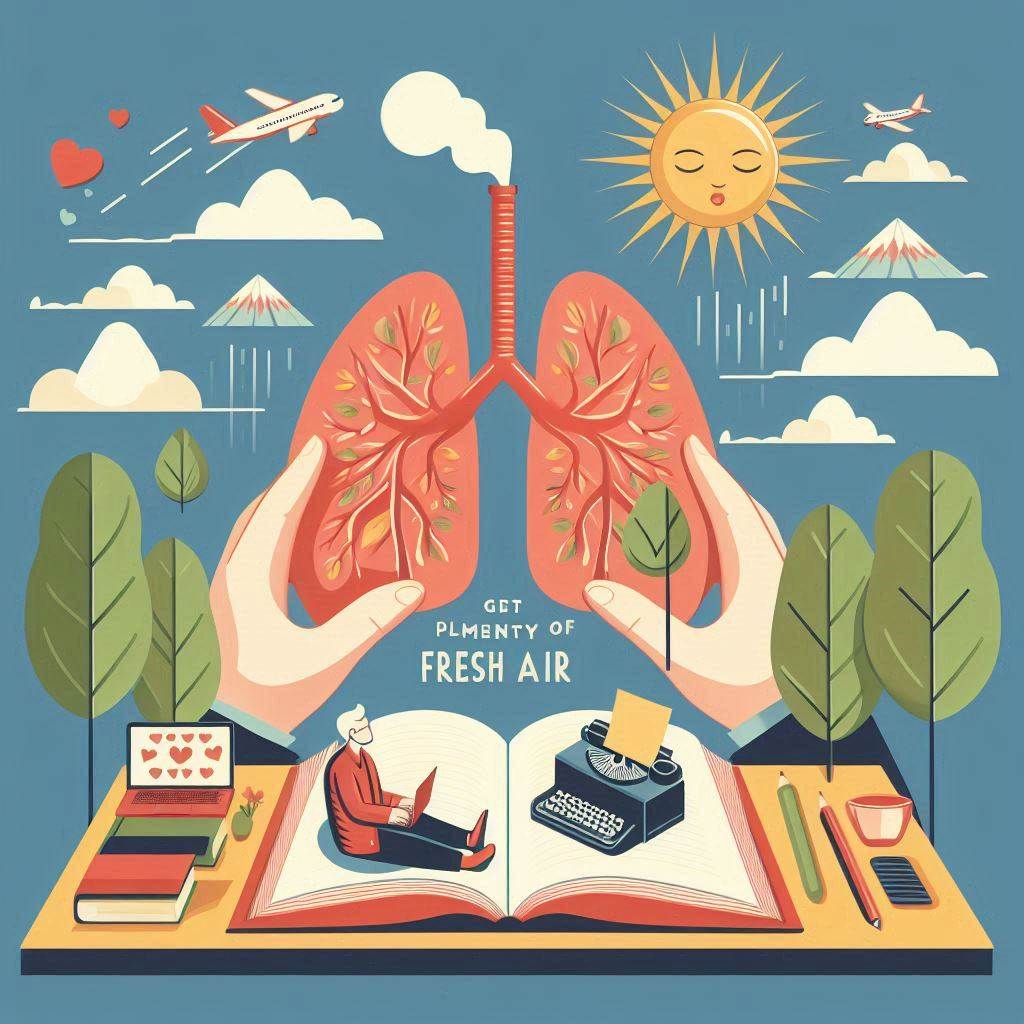Introduction
Fresh air is something we often take for granted, but its importance can’t be overstated. Whether it’s a cool breeze on a summer day or the crisp chill of a winter morning, fresh air plays a crucial role in our overall health and wellbeing. But what exactly makes fresh air so vital? In this guide, we’ll explore the many benefits of fresh air, how to incorporate more of it into your life, and why it’s essential for everyone—from children to adults—to get outside and breathe in nature’s goodness.
What is Fresh Air?
Fresh air refers to the clean, unpolluted air found outdoors, particularly in natural environments. Unlike indoor air, which can be stale and filled with dust, chemicals, and other pollutants, fresh air is rich in oxygen and free from harmful contaminants. It’s this purity that makes fresh air so beneficial to our bodies and minds.
The Health Benefits of Fresh Air
Physical Health
Boosts Immune System: Fresh air is a natural immune booster. When you breathe in clean air, your body absorbs more oxygen, which helps your cells function properly. This boost in oxygen also enhances your immune system’s ability to fight off illnesses and infections.
Improves Lung Function: Breathing in fresh air helps expand your lungs, improving their capacity and function. It also helps to clear out the pollutants and toxins that can accumulate in the lungs from breathing indoor air, especially in areas with poor ventilation.
Mental Health
Reduces Stress and Anxiety: Fresh air is a natural stress reliever. Spending time outdoors and breathing in fresh air can lower cortisol levels, which are responsible for stress. It also provides a calming effect, reducing anxiety and helping you feel more relaxed.
Enhances Mood and Energy Levels: Fresh air is a mood enhancer. Exposure to natural light and fresh air increases serotonin levels, the hormone that boosts your mood and energy levels. This is why spending time outdoors can make you feel happier and more energized.
Fresh Air and Exercise

Outdoor vs. Indoor Exercise
Exercising outdoors provides a double benefit: not only are you engaging in physical activity, but you’re also breathing in fresh air. Unlike indoor exercise, where air quality can be poor, outdoor exercise allows you to fill your lungs with clean air, which can improve your endurance and performance.
How Fresh Air Enhances Physical Activity
Fresh air enhances physical activity by providing your muscles with more oxygen, helping them function more efficiently. It also helps to regulate your body temperature, keeping you cool as you exercise, which can prevent overheating and dehydration.
Fresh Air and Children
Importance for Child Development
Children need fresh air for healthy development. Outdoor play not only gives them the opportunity to explore and be active, but it also exposes them to fresh air, which is essential for their growing bodies. Fresh air helps strengthen their immune systems, improves their lung capacity, and supports overall physical and mental wellbeing.
Encouraging Outdoor Play
Encouraging children to play outside is crucial. Simple activities like going to the park, riding a bike, or even just playing in the backyard can provide them with the fresh air they need. Parents should prioritize outdoor activities and limit screen time to ensure their children are getting enough fresh air.
The Science Behind Fresh Air

How Oxygen Impacts the Body
Oxygen is essential for life, and fresh air is a rich source of it. When you breathe in fresh air, the oxygen is absorbed into your bloodstream and transported to your cells, where it is used to produce energy. This process is vital for every function in your body, from thinking to moving.
The Role of Negative Ions
Fresh air, especially near natural environments like forests and waterfalls, contains negative ions. These ions have been shown to have numerous health benefits, including improving mood, reducing stress, and enhancing cognitive function. Negative ions also help purify the air, making it even healthier to breathe.
Common Misconceptions About Fresh Air
Fresh Air Myths Debunked
One common myth is that fresh air is only beneficial in rural or remote areas. However, even urban parks and green spaces can provide fresh air that is beneficial to your health. Another misconception is that indoor air is always clean, but it can actually be more polluted than outdoor air due to the accumulation of dust, chemicals, and other pollutants.
Indoor Air vs. Outdoor Air
Indoor air quality can be surprisingly poor, especially in homes or offices with little ventilation. Outdoor air, even in urban areas, is often cleaner and more oxygen-rich, making it healthier to breathe. Opening windows or spending time outside can significantly improve the quality of the air you breathe.
How to Get More Fresh Air in Daily Life

Simple Steps for Urban Dwellers
Living in a city doesn’t mean you can’t enjoy fresh air. Make it a habit to take a walk during your lunch break, spend time in local parks, or even just open your windows at home. If possible, consider taking weekend trips to nearby nature reserves or countryside areas to get a dose of cleaner air.
Incorporating Fresh Air into Daily Routines
Incorporating fresh air into your daily routine is easier than you might think. Start your day with a morning walk, take your coffee break outside, or spend time gardening in the afternoon. These small changes can make a big difference in the amount of fresh air you get each day.
Fresh Air and Sleep Quality
How Fresh Air Improves Sleep
Fresh air can improve your sleep quality by helping to regulate your body temperature and providing your brain with more oxygen. This can lead to deeper, more restful sleep. Try sleeping with your window slightly open or spending time outside before bed to help improve your sleep.
Best Practices for Sleeping with Fresh Air
To get the benefits of fresh air while you sleep, consider keeping your bedroom window open, even just a crack. If you live in a noisy area, using a white noise machine can help mask any outdoor sounds. Make sure your bedroom is well-ventilated and free from pollutants to ensure the air you breathe is as clean as possible.
Tips for Getting Fresh Air in Different Seasons

Spring and Summer Tips
In the warmer months, it’s easier to spend time outside. Take advantage of the longer days by going for walks, having picnics, or simply sitting outside to enjoy the fresh air. Just remember to stay hydrated and wear sunscreen to protect your skin from the sun’s rays.
Fall and Winter Strategies
Even in the colder months, fresh air is important. Dress warmly and go for a brisk walk to get your daily dose of fresh air. If the weather is too harsh, try sitting near an open window or spending time in a sunroom. Fresh air can help prevent the winter blues and keep your immune system strong.
The Role of Fresh Air in Workplace Productivity
How Fresh Air Boosts Focus and Creativity
Fresh air can boost your productivity by increasing your focus and creativity. When your brain gets more oxygen, it functions better, allowing you to think more clearly and work more efficiently. Try taking regular breaks to step outside and breathe in some fresh air during your workday.
Encouraging Outdoor Breaks
Encouraging outdoor breaks at work can improve both your physical and mental health. Even just a few minutes spent outside can refresh your mind and help you return to work with renewed energy. If possible, suggest walking meetings or outdoor brainstorming sessions to incorporate fresh air into your workday.
Fresh Air and the Immune System

How Fresh Air Strengthens Immune Response
Fresh air can strengthen your immune system by providing your body with the oxygen it needs to function properly. Exposure to fresh air also helps your body produce more white blood cells, which are essential for fighting off infections and diseases.
Preventing Illness Through Fresh Air Exposure
Regular exposure to fresh air can help prevent illness by boosting your immune system and keeping your lungs healthy. Make it a habit to spend time outdoors every day, even if it’s just for a short walk around the block.
Outdoor Activities to Enjoy Fresh Air
Hiking and Walking
Hiking and walking are great ways to enjoy fresh air while also getting exercise. These activities can be done almost anywhere, from city parks to mountain trails, and they provide an excellent opportunity to breathe in clean, fresh air.
Gardening and Picnics
Gardening and picnics are other enjoyable ways to spend time outside. Gardening allows you to connect with nature and breathe in fresh air while also getting some light exercise. Picnics are a fun way to enjoy a meal outdoors and soak in the beauty of your surroundings.
The Environmental Impact of Fresh Air
How Pollution Affects Air Quality
Air pollution is a significant threat to fresh air. Pollutants from cars, factories, and other sources can degrade air quality, making it harmful to breathe. It’s important to be aware of pollution levels in your area and take steps to protect yourself, such as avoiding outdoor activities on high-pollution days.
Steps to Preserve Clean Air
Preserving clean air is crucial for our health and the environment. You can help by reducing your carbon footprint, using public transportation, and supporting policies that promote clean air. Every little bit helps in the fight to keep our air clean and breathable.
Conclusion
Fresh air is more than just a pleasant experience—it’s a vital part of maintaining good health and wellbeing. Whether you’re looking to boost your immune system, improve your mood, or simply enjoy the great outdoors, getting plenty of fresh air should be a priority in your daily life. So, take a deep breath, step outside, and embrace the benefits that fresh air has to offer.
FAQs
How Much Fresh Air Do I Need Daily?
It’s recommended to spend at least 20-30 minutes outside each day to reap the benefits of fresh air.
Can Fresh Air Really Improve My Mood?
Yes, fresh air can improve your mood by increasing your serotonin levels and reducing stress.
What If I Live in a Polluted Area?
If you live in a polluted area, try to find local parks or green spaces where the air quality is better. You can also use air purifiers at home to improve indoor air quality.
How Can I Encourage My Kids to Play Outside?
Encourage outdoor play by setting aside time each day for activities like biking, playing in the yard, or visiting a local park.
Is Fresh Air Important for Pets Too?
Absolutely! Pets benefit from fresh air just like humans do. Regular walks and outdoor playtime are great for your pet’s health and happiness.



